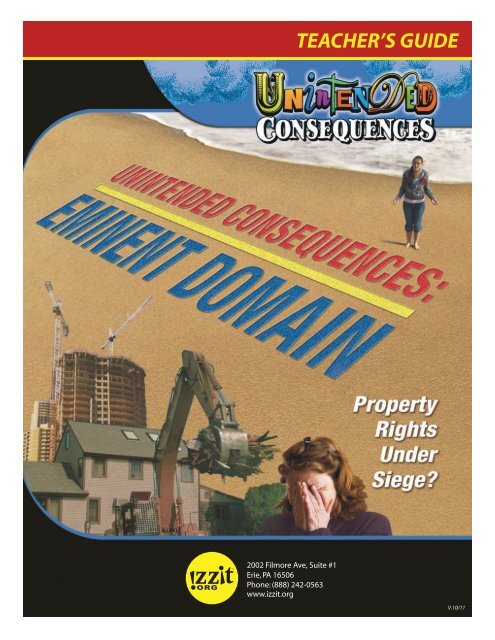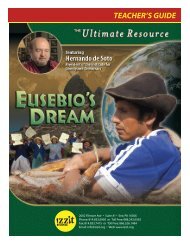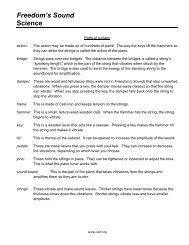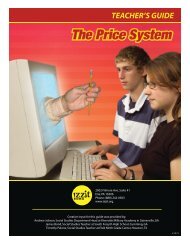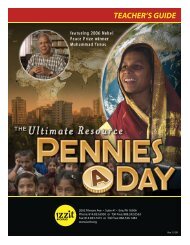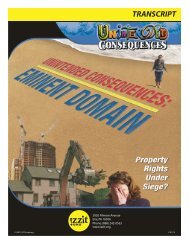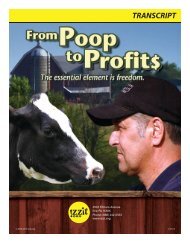Unintended Consequences: Eminent Domain Teacher's ... - Izzit.org
Unintended Consequences: Eminent Domain Teacher's ... - Izzit.org
Unintended Consequences: Eminent Domain Teacher's ... - Izzit.org
You also want an ePaper? Increase the reach of your titles
YUMPU automatically turns print PDFs into web optimized ePapers that Google loves.
TEACHER’S GUIDE<br />
2002 Filmore Ave, Suite #1<br />
Erie, PA 16506<br />
Phone: (888) 242-0563<br />
www.izzit.<strong>org</strong><br />
V.10/11
<strong>Unintended</strong> <strong>Consequences</strong>: <strong>Eminent</strong> <strong>Domain</strong><br />
Teacher’s Guide<br />
This Teacher’s Guide includes the following:<br />
● Suggested Lesson Plan<br />
● Worksheet<br />
● Discussion Questions<br />
● Quiz<br />
● Enrichment Activities<br />
● Reference<br />
--------------------------------------------------------------------------------<br />
These materials may be used in a variety of ways. For maximum benefit, we suggest the following<br />
lesson plan progression:<br />
● Ask students what they know about eminent domain.<br />
● Distribute copies of the Worksheet for students to use as a note-taking guide during the<br />
video.<br />
● Watch the video, pausing if needed to facilitate understanding and note-taking.<br />
● Review and discuss Worksheet answers.<br />
● Use Discussion Questions to spark class discussion, or assign these questions as<br />
homework.<br />
● Replay the video as preparation for the Quiz.<br />
● Administer the Quiz and grade in class using Quiz Answers as a guide.<br />
● Assign selected Enrichment Activities as class work, homework, or extra credit.<br />
1
Name:<br />
Date:<br />
<strong>Unintended</strong> <strong>Consequences</strong>: <strong>Eminent</strong> <strong>Domain</strong><br />
Worksheet – Page 1<br />
1. According to the film, why was the Constitution written?<br />
2. What did the Founders believe about property rights?<br />
3. What is eminent domain?<br />
4. Which of our founding documents grants the power of eminent domain to government?<br />
5. Does eminent domain give government the power to take your property even if you don’t want<br />
to sell?<br />
6. According to the Constitution, which two conditions must be met for the government to<br />
exercise eminent domain?<br />
7. How has “public use” traditionally been defined? Give examples.<br />
8. Since the Supreme Court ruled in favor of a Washington, D.C. urban renewal project in 1954,<br />
how has eminent domain been used in a dramatically different way?<br />
9. Who is Bruce Broadwater? Why is he in favor of using eminent domain for redevelopment?<br />
2
Worksheet – Page 2<br />
10. What are journalist Steven Greenhut’s views about “just compensation”?<br />
11. What does the city of Arcadia, CA want to do with the property belonging to the owner of<br />
Rod’s Grill?<br />
12. What has been the most important and controversial eminent domain case in United States<br />
history? Who won? Was it a unanimous decision?<br />
13. What was the impact of the Supreme Court’s decision in the 2005 eminent domain case?<br />
14. What has happened at the state level in response to the 2005 Supreme Court ruling?<br />
3
<strong>Unintended</strong> <strong>Consequences</strong>: <strong>Eminent</strong> <strong>Domain</strong><br />
Worksheet Answers<br />
1. The Constitution was written to protect individual rights from government power.<br />
2. The Founders believed property rights to be one of the most important individual rights.<br />
3. <strong>Eminent</strong> <strong>Domain</strong> is the concept of government taking private property for public use.<br />
4. Fifth Amendment to the Constitution grants the power of eminent domain to government.<br />
5. Yes, eminent domain gives government the power to take your property even if you don’t want<br />
to sell.<br />
6. The two conditions which must be met for the government to exercise eminent domain are:<br />
1) Must be for public use 2) Owners must be paid just compensation<br />
7. Some examples of “public use” are schools, roads, hospitals, reservoirs, and police<br />
departments.<br />
8. Since the 1954 Supreme Court ruling, eminent domain has been used to transfer property from<br />
one private owner to another private owner.<br />
9. Bruce Broadwater is the City Councilman and former Mayor of Garden Grove, CA. He<br />
believes the city is responsible for maintaining housing stock and eminent domain is a good<br />
tool for redevelopment. Developers bring higher tax revenue to the city.<br />
10. Steven Greenhut believes that owners often do not receive just compensation when<br />
governments exercise eminent domain.<br />
11. The city of Arcadia, CA wants to make Rod’s Grill property into a parking lot for a car dealer<br />
to increase tax revenue.<br />
12. The most important and controversial eminent domain case in U.S. history was Kelo vs. New<br />
London, CT. New London won. No, the decision was 5 to 4.<br />
13. The Supreme Court’s decision in the 2005 eminent domain case resulted in a dramatic increase<br />
in the use of eminent domain for economic development.<br />
14. Concerned citizens have spoken out in response to the 2005 Supreme Court ruling. At least 30<br />
states have placed new limits on eminent domain use.<br />
4
Name:<br />
Date:<br />
<strong>Unintended</strong> <strong>Consequences</strong>: <strong>Eminent</strong> <strong>Domain</strong><br />
Quiz<br />
True or false? If false, correct the statement to make it true.<br />
1. The Constitution protects individual rights from government power.<br />
2. The Founders did not consider property rights to be important.<br />
3. <strong>Eminent</strong> domain gives government the power to take your property under certain conditions,<br />
even if you don’t want to sell.<br />
4. In 2005, the Supreme Court voted unanimously in favor of government using eminent domain<br />
for economic development.<br />
5. Today, eminent domain is being used to force some private owners to turn over their property<br />
to other private owners.<br />
Answer in a few words.<br />
6. Which part of the Constitution spells out the exception/limitation on private property rights<br />
known as eminent domain?<br />
7. According to the eminent domain clause of the Constitution, what two conditions must be met<br />
for government to exercise its power of eminent domain?<br />
8. Give three examples from the video of the types of projects eminent domain was traditionally<br />
limited to until the 1950’s.<br />
9. What has been the most important and controversial eminent domain case in United States<br />
history?<br />
10. Using eminent domain for economic development means government takes property from<br />
__________________________ and gives it to _________________________.<br />
5
<strong>Unintended</strong> <strong>Consequences</strong>: <strong>Eminent</strong> <strong>Domain</strong><br />
Quiz Answers<br />
1. True<br />
2. False (Remove the word not. The Founders considered property rights to be very important.)<br />
3. True<br />
4. False (Replace unanimously with 5 to 4 or in a split decision.)<br />
5. True<br />
6. The Fifth Amendment<br />
7. 1) Must be for public use 2) Owners must be paid just compensation<br />
8. Three of the following: 1) schools 2) roads 3) hospitals 4) reservoir 5) police department<br />
9. Kelo vs. New London, CT<br />
10. One private owner; another private owner<br />
6
<strong>Unintended</strong> <strong>Consequences</strong>: <strong>Eminent</strong> <strong>Domain</strong><br />
Discussion Questions<br />
1. Since the terms “public use” and “just compensation” are not defined in the Constitution, how<br />
has their meaning been determined?<br />
2. How did the 1954 Supreme Court ruling depart from the traditional interpretation of eminent<br />
domain? Is home ownership more secure or less secure under the new interpretation? Explain.<br />
3. How are projects such as schools and roads fundamentally different than the economic<br />
development projects highlighted in the video? What is the essential difference?<br />
4. Prior to 1954, how did developers acquire a desirable piece of property? Given the current<br />
interpretation of eminent domain, how else might the developer acquire the property? What is<br />
the impact of the new interpretation on property owners? On developers?<br />
5. What does “economic development for the good of the community” mean if some people are<br />
hurt and some are helped by it? What is to prevent politicians from taking property in the name<br />
of economic development in order to enhance political contributions from large developers?<br />
6. Why does the journalist, Steven Greenhut, oppose taking property from one private owner and<br />
giving it to another private owner? Is he against improving bad neighborhoods?<br />
7. In New London, CT, one hundred property owners agreed to sell to the developers, and only a<br />
few refused. Is it fair for a minority to be able to block a new development?<br />
8. Why did the Kelo case spark a huge debate about the importance of property rights? What was<br />
the case about? Who won? What has been the impact of the Court’s decision upon the use of<br />
eminent domain to transfer private property from one owner to another private owner?<br />
9. Why was Kelo a victory for city planners? Why do many people think the Kelo decision gave<br />
government too much power?<br />
10. According to Justice John Paul Stevens, writing in the majority opinion in Kelo, “…that<br />
plan…serves a public purpose…” What public purpose did it serve? Is “public purpose” in<br />
this sense the same as “public use” as traditionally understood?<br />
11. Who should make decisions about how property is used, the people who own the property, or<br />
the government?<br />
12. According to Bruce Broadwater, “There are people who think that property has more rights<br />
than human beings.” What does he mean by this? Does the concept of property rights mean<br />
that property has rights? Is there a conflict between property rights and human rights?<br />
7
<strong>Unintended</strong> <strong>Consequences</strong>: <strong>Eminent</strong> <strong>Domain</strong><br />
Enrichment Activities<br />
Debate/Essay Topics<br />
Divide into groups and debate one of the propositions below. Or, use these as additional essay<br />
topics. Students should provide evidence and reasoning to support their views.<br />
1. The Founders made a mistake when they granted government the right of eminent domain.<br />
2. Government should never intervene on behalf of private interests.<br />
3. “There are people who think that property has more rights than human beings.”<br />
4. If eminent domain can be used for any public purpose, then all property is at risk, especially<br />
property owned by poor people without political influence.<br />
Essay Topics<br />
1. “This is America. This is a country with free enterprise. You have all the rights to own your<br />
property, your own home, your own business. You have the right to build your American<br />
dream.”<br />
2. “The use of eminent domain is a delicate tool, but it is a tool and it helps keep a community<br />
clean; it helps keep a community vibrant. It’s a good tool and, definitely, I don’t think it should<br />
be taken away.”<br />
3. “You don’t take stuff that doesn’t belong to you. And that’s the way I was raised. That’s the<br />
way I raised my children, and that’s the way most people think…These are our homes.”<br />
Research Report<br />
Find out what the law is regarding eminent domain in your state and whether it has recently<br />
changed.<br />
8
<strong>Unintended</strong> <strong>Consequences</strong>: <strong>Eminent</strong> <strong>Domain</strong><br />
Reference<br />
“…nor shall private property be taken for public use without just compensation.”<br />
--<strong>Eminent</strong> <strong>Domain</strong> clause of the Fifth Amendment to the United States Constitution<br />
------------------------------------------<br />
“The city has carefully formulated an economic development plan that it believes will provide<br />
appreciable benefits to the community, including—but by no means limited to—new jobs and<br />
increased tax revenue…Because that plan unquestionably serves a public purpose, the takings<br />
challenged here satisfy the public use requirement of the Fifth Amendment.”<br />
--Justice John Paul Stevens, majority opinion of the Supreme Court, Kelo vs. New London, CT<br />
------------------------------------------<br />
“Under the banner of economic development, all private property is now vulnerable to being taken and<br />
transferred to another private owner, so long as it might be upgraded…nothing is to prevent the state<br />
from replacing any Motel 6 with a Ritz Carlton, any home with a shopping mall, or any farm with a<br />
factory.”<br />
--Justice Sandra Day O’Connor, dissenting opinion of the Supreme Court, Kelo vs. New<br />
London, CT<br />
9
We are very interested to learn<br />
how you use our material. Please<br />
share your experiences or lesson<br />
plan ideas by visiting us<br />
at www.izzit.<strong>org</strong>.<br />
2002 Filmore Ave, Suite #1<br />
Erie, PA 16506<br />
Phone: (888) 242-0563<br />
www.izzit.<strong>org</strong>


